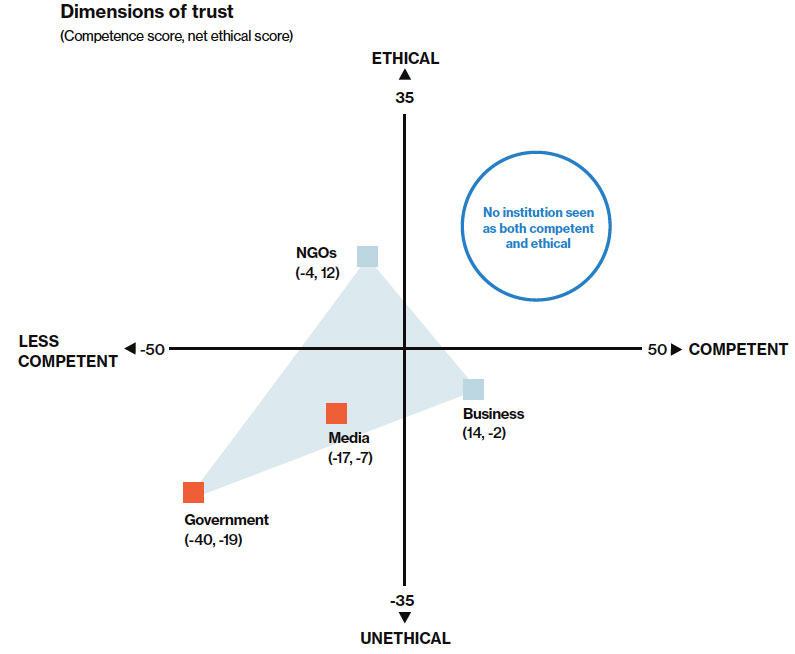How does society see businesses, governments or the media? How much do people trust these institutions with the complex tasks od dealing with the world’s largest challenges?
The 2020 Edelman Trust Barometer is the company’s 20th annual trust and credibility survey. The information it gathered consists of 30-minute online interviews with more than 34,000 respondents across 28 markets.
Among other relevant findings, the global survey shows none of the four societal institutions measured – government, business, NGOs and media – is trusted. Let’s try to understand why.
No Institution Is Both Ethical And Competent, Respondents Say
Richard Edelman says the way the company has been measuring trust has been changing over the years. The CEO of Edelman introduces the idea that today they measure trust by focusing on two main attributes. These are competence, i.e., the ability to deliver on promises, and ethical behaviors – doing the right thing and working to improve society.
When we start digging into the survey’s results, they show none of the four institutions analyzed are seen as both ethical and competent. While businesses are better placed when it comes to competence, governments are seen as quite incompetent as they stay 54-points below businesses. On the other hand, governments are trusted more than twice as much to protect the environment and close the inequality gap.
Of course, trust changes according to the specific groups of people targeted. We’ve seen this with, for instance, the Pew Research Center’s results were women, Democrats, younger people showed larger concerns with climate change issues. As per this survey, it speaks of 2 trust realities: the informed public (who is more educated, wealthier and consumers more news) and the mass population.
While the first group remains far more trusting in every institution, the second is highly concerned and doubting the system. “Trust in business and NGOs among the informed public is 15 points higher than it is for the mass population; for media, the difference is 14 points; for government, 12 points.”

The Concerns And Distrust Of The People
The survey shows people’s concerns are wide-ranging and profound. 57% of the general population believes governments serve only the interests of the few. Somewhere in the middle of the report, we can see a huge, red, 56% covering nearly half a page.
56 is the percentage who thinks capitalism does more harm than good, while 78% agree the “elites are getting wealthier while regular people struggle to pay the bills.” In fact, less than 1 in 5 respondents think the system is working for them as the share of markets recording trust inequality being at its all-time high.
83% of people globally are worried they’ll lose their jobs and feel threatened by the gig economy, the sharing economy, AI and automation or cheaper immigrant competition. 61% fear governments don’t have enough knowledge or don’t move fast enough to effectively regulate emerging technologies.
Why Don’t People Trust Businesses?
66% of people say they don’t have confidence their current leaders will successfully address their country’s challenges. This, together with the already seen distrust in the system and the fears – about income inequality, sustainability, fake news, and AI – makes it clear something needs to change.
Addressing the world’s biggest challenges while getting society’s trust back is a highly complex plan and no single institution can (or has the means to) take it alone. However, while businesses are perceived as highly competent, they are also believed to be too self-interested. In the end, competence isn’t enough. Ethics also plays a huge role and businesses end up not being trusted.
The business ethics shortfall may be partially due to years of communication efforts focused on performance, competence or product quality rather than on purpose and integrity – analysts at Edelman say. Using their consultancy data files, they found out a significant percentage of stakeholders familiar with business competence but who felt they didn’t know enough to judge a company’s ethics.
Sure, this can help explain the lack of trust in businesses. But the absence of ethical information doesn’t probably tell the whole story. Businesses have been focusing on business as usual, rather on conscious capitalism. Many used lobbying strategies and ignored social and environmental impacts (as has been the case with fossil-fuel companies, according to the Guardian) at the excuse of maximizing profits. And this wasn’t likely very good for their reputation and trust either.
The Need To Bet On CSR, Create Partnerships And Cooperate
Perhaps the survey’s respondents are showing up the way. In the midst of what they think each institution is doing well (and, therefore, what they can improve), partnerships remain a consistent low-score among business, government, and NGOs. So it looks society is asking these institutions for a better collaboration so they can trust them more and have greater confidence societal challenges will be effectively dealt with.
Richard Edelman says businesses need to take the lead on solving the trust paradox and getting everyone together on the same page as they have the greatest freedom to act. But will they? They are expected to – at least according to the 92% employees surveyed in this Barometer. They expect their CEOs to speak up on one or more issues ranging from income inequality to the jobs of the future.
We’ve also analyzed several studies also showing consumers buy more from brands that are transparent and take action on these global challenges. Unfortunately, success metrics don’t (at least yet) include the value of ecosystem services and human well-being.
The remaining point is that even those businesses with the best intentions will (and do) face a system based on continuous growth (and fearless competition). This isn’t a great match with a world with finite resources and a circular economy model that’s very difficult to be (truly) implemented. Making some good doesn’t mean fixing the root cause of problems. Will these societal actors keep fishing the problems, or work harder on finding and tackling the original issue(s)?
[Image credits to Wattanakul on Shutterstock]

